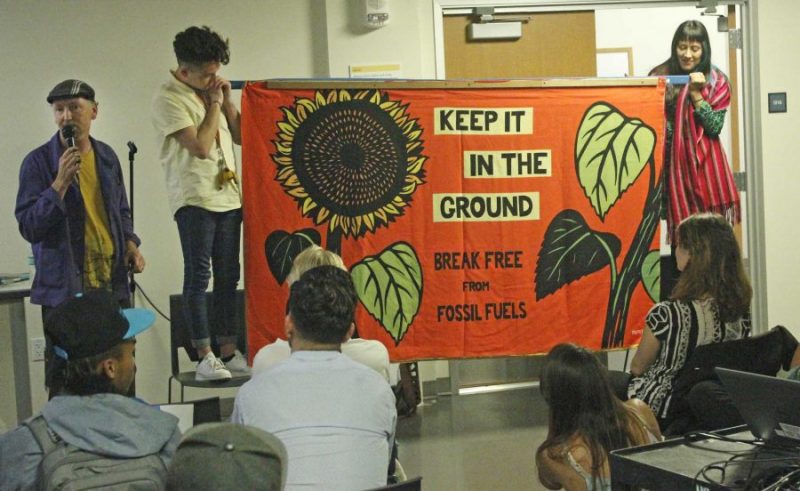Ashel Eldridge, a musician with the green hip-hop group Earth Amplified, began the first Climate Justice Speaker Series of the semester with a chant. With his eyes closed and head bowed, the spiritual activist recited an indigenous Japanese chant to introduce the topics of art, climate justice and spiritual activism on Wednesday evening.
This presentation began the Climate Justice Speaker Series, a part of the Climate Justice Initiative headed by ethnic studies professor Philip Klasky, which seeks to engage students with the climate justice movement.
“Climate justice is the most immediate, most important environmental, political, economic and moral issue of our time. It will impact everyone,” Klasky said.

Klasky and the four sections of his race, activism, and climate justice course put on the event, another part of the Climate Justice Initiative that has grown since its introduction last year. The course combines the science behind climate change with critical race theory and activism in an effort to empower students to take action.
In addition to being a musician and an activist, Eldridge teaches an online section of the race, activism, and climate justice class at SF State.
Eldridge, who also goes by Seasunz to represent the ever-changing styles of his music, has been involved in Earth Amplified since 2010 after he began to notice how music made people pay attention. The four-piece band plays “hard-hitting, conscious, roots-rap-reggae,” seeks to be “the voice of the earth” and wants bring awareness to pressing environmental issues, according to their website.
During his presentation, Eldridge screened four of Earth Amplified’s music videos: “Solarize,” “Global WarNing,” “Food Fight” and “Lady Justice.” The songs touched on a range of social justice and environmental issues such as indigenous rights, corporate pollution, processed food and female empowerment.
Stressing that there’s never a shortage of things to get creative about, Eldridge ended his presentation by encouraging everyone to “be the art” and to find whatever inspires them to take action.
“So much is being uncovered right now. There’s a natural flow of things being revealed right now. It gives me hope that people are waking up and seeing their interconnectedness,” Eldridge said.
The North American Arts Organizer for 350.org, David Solnit, also spoke at the event and discussed how art can be used to educate people and incite change. Operating on the idea that artists have the most powerful tools, he has used art in a number of ways. Some of his past projects include painting sunflowers as symbols of climate justice and protesting oil companies with a giant picture book.

Though Solnit is concerned about the current state of the environment and climate justice, he remains optimistic.
“What great time to be alive,” Solnit said. “Climate change is definitely crucial and impacting us, but it has created an organizing factor where everybody is screwed over by the same thing, so we can all get together and start a global revolution.”
His current project, which left screen-printing ink splattered on his hands, is painting banners for the pipeline protest at Standing Rock. He planned to drive the banners, which feature purifying Thunderbirds, to South Dakota on Friday.
Students interested in this event filled up one room in the library, forcing the event coordinators to relocate the overflow into a second room.
Marketing major Cormac Pujals is one of Klasky’s teaching assistants who helped plan the event. He believes climate justice is one of the most pressing issues.
“It affects every cultural issue. We’re all native to the earth, and we’re all affected by the detriments,” Pujals said. “It’s important just having these conversations with your peers.”







